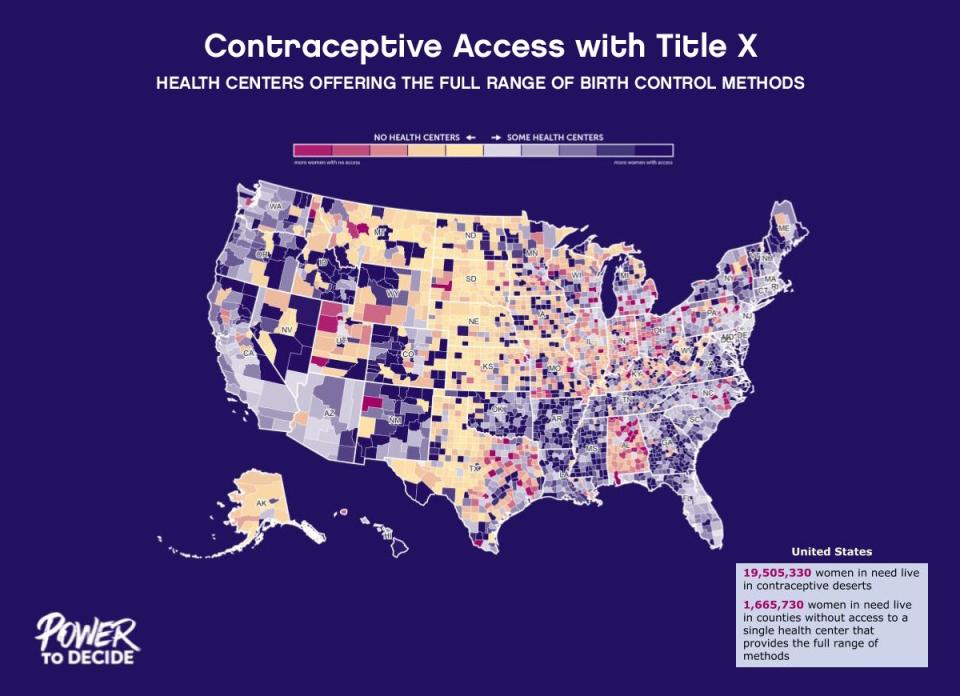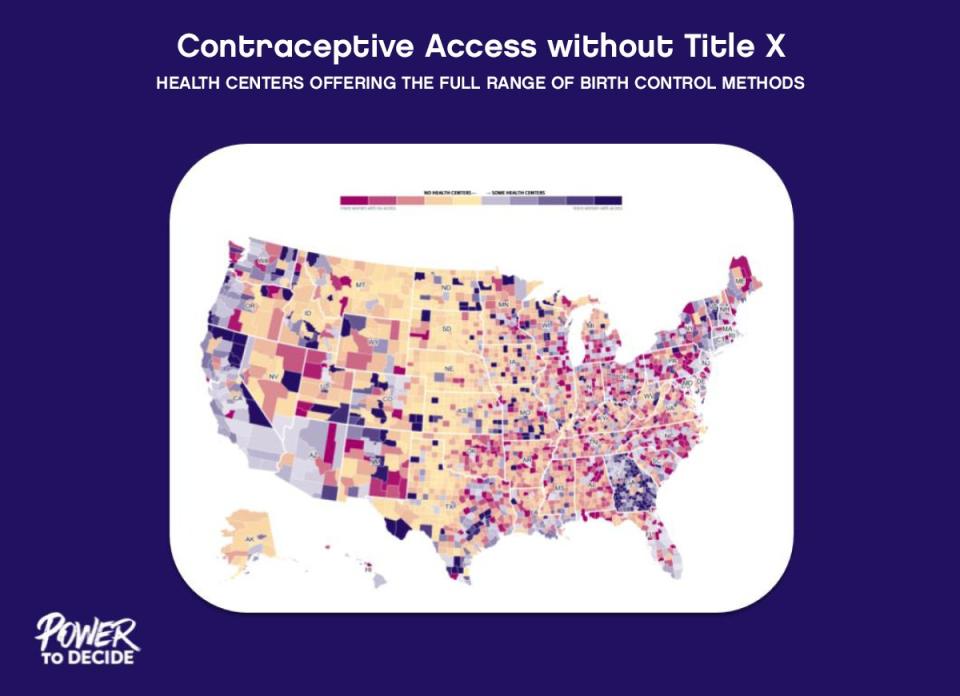If Title X Disappears, More Than 22 Million Women Will Live in Contraceptive Deserts
Since day one of Trump's administration, it has been hellbent on stripping women of their reproductive rights, with a combo of dangerous talk and threatening policies. It’s a lot to keep track of, but the attacks on Title X, a program enacted during the Nixon administration that ensures access to reproductive and preventive services to people with low incomes, could have the most devastating effect on the largest number of women. If the Trump administration stops supporting the organizations—mostly low-income clinics—that receive Title X funding, millions of women across the country will lose access to affordable birth control.
If you’ve ever gotten birth control at a Planned Parenthood or had a Pap smear at a local clinic, you’ve probably been the recipient of Title X money, though you might not have realized it. Sixty-six million women of reproductive age live in the U.S.—that’s 20 percent of the entire U.S. population—and of those women, 20 million couldn’t get birth control without public funding.
This is where Title X comes in.
The funding program issues federal grants to clinics that offer family planning services; it plays a “critical role” in ensuring women have access to a broad range of health services, according to the Department of Health and Human Services. But in February the Trump administration announced it would bar Title X funds from going to any clinic that included abortion as a method of family planning. Translation: The “domestic gag rule” would ensure any clinic where doctors perform abortions or even provide referrals for abortions would not get any federal dollars.
Women Without Options
Even now Title X doesn’t help enough women get care. More than 19.5 million women in the U.S. already live in “contraceptive deserts,” areas where there’s less than one health center that provides a full range of birth control options per every 1,000 women who need to access contraception. (What’s worse: 1.6 million women lack access to a single health center that provides birth control options.) “Every woman has a different life situation and a different body composition, so it's important that women can get the method that's right for them,” says Ginny Erlich, CEO of Power to Decide, a national advocacy group that works to prevent unplanned pregnancy. “It's like any other medication: There's not a one-size-fits-all birth control, so it's really important to make sure that women have the access they deserve to all methods of contraception.”

For these 19.5 million women in contraceptive deserts, it's not just about paying for contraception; it's about the trade-offs they have to make to get contraception, says Erlich: “Will they use their gas money to drive to a clinic that’s two to three hours away to get birth control? Or will they drive to work? These are the trade-offs women living in contraceptive deserts have to deal with every day just to access what we believe is basic health care.”
If the Trump administration is successful in slashing funding and Title X clinics must close, the picture becomes even more grim: More than 22 million women would be forced into contraceptive deserts (with 4.2 million women left without access to a single clinic).

Some states are more vulnerable than others. In Maine fewer than 1,000 women currently live in areas without access to a single health center providing a full range of birth control options—pretty good by national standards—largely thanks to Title X clinics. But if those clinics were to close, nearly 40,000 more women would be without access. In Oklahoma removing Title X would put more than 130,000 more women in contraceptive deserts—nearly 80 times the number currently lacking access to affordable birth control providers.
Changes like this exist across the map. “This won’t just affect red states or blue states, urban areas or rural areas,” says Rachel Fey, director of public policy at Power to Decide. This will affect women who need access to affordable birth control across the country.
This Isn’t Just About Abortion
Attacks on abortion rights are reaching a vicious fever pitch; states across the country are passing abortion bans that could leave women and doctors facing murder charges. (Yes, really. This isn’t a plot line from The Handmaid’s Tale.)
But Title X isn’t about abortion. Since the program was introduced in 1970, it’s barred clinics from using federal money to fund abortions; the grants are used solely to fund nonabortion services like cancer screenings, Pap tests, and birth control (the latter of which 78 percent of Americans consider a basic part of women’s health care, according to a recent poll from Power to Decide). Opponents of access to reproductive care are trying to conflate the two—a dangerous cocktail of misinformation.
The domestic gag rule hasn’t gone into effect yet—it was blocked by a federal court ruling last month that will temporarily keep the funds flowing—but if it does, the consequences will be drastic. Complying with the new rules means two things for clinics: If they currently perform abortions, they will have to physically and financially separate the procedure from the rest of the clinic. That would require building renovations that could cost providers upwards of $40,000, according to The Atlantic—money many clinics don’t have.
Even more important than the financial cost of compliance is the ethical price providers would pay. “A lot of providers would no longer participate in the program because [they view it as] a violation of medical ethics to not give women full and complete information about their health care options” including abortion and abortion referrals, says Fey.
Not all Title X clinics would disappear with a lack of funding, but a significant portion likely would, Fey says. Funds are instead already going to Crisis Pregnancy Centers, typically religious organizations which often give women in need false information about birth control and abortion.
What Happens Now
The fight is on. For now at least, clinics that provide abortion care are still getting Title X money. A federal judge blocked the gag rule from going into effect after lawsuits demonstrated it “likely violates the central purpose of Title X, which is to equalize access to comprehensive, evidence-based, and voluntary family planning,” The Washington Post reported.
Oregon’s State Attorney General Ellen Rosenblum is leading a group of her counterparts in 20 states in the fight to make that injunction permanent. She’s optimistic. “Democratic AGs are going to continue to fight this to the end,” Rosenblum says. “We cannot have doctors muzzled from being allowed to provide options to their patients, and we cannot have contraceptive ‘deserts,’ which will lead to more unintended pregnancies and less overall preventive health care.”
Macaela MacKenzie is a senior editor at Glamour. Follow her on Instagram @macaelamac and Twitter @MacaelaMack.
Originally Appeared on Glamour



